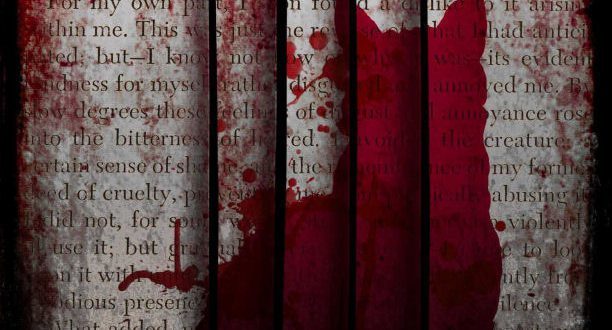The P.O.E. films are probably one of the more unique anthology series out there. The titles have been producing a various number of interesting interpretations on the late writer’s work. Thus far, I have only seen P.O.E. 3: Pieces Of Eldrich besides this fourth installment, but I do have P.O.E. 2 in my sights. P.O.E. 4: The Black Cat changes direction by focusing solely on The Black Cat as the title suggests. We get three tales: “House Of The Black Cat” by Chris Milewski, “Black” by Domiziano Cristopharo and “Insomnia” by Brace Beltempo.
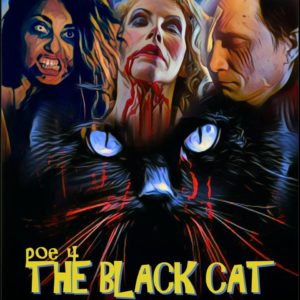
The first story, “House Of The Black Cat,” reminds me heavily of Lucio Fulci, who also did a movie titled The Black Cat in 1981. Fulci is always big on extreme violence, close up facial shots, eerie music and creepy locations. This is definitely an homage to Fulci or giallo-style cinema in general. The soft camera lens used to produce the hazy border of the screen, the music which is reminiscent of Fabio Frizzi, the over the top close up shots of violence… it’s all here.

“House Of The Black Cat” is low on dialogue, but it makes up for it in atmosphere. The plot is vague but decipherable. We get a man named Mr. Allan (Jeffrey Voice) who seems to be an artist or architect of some sort. We see that Mr. Allan is blind but still doing an amazing sketch of what seems to be the house he resides in. His assistant, Eugenie (Karen Lynn), serves Mr. Allan his tea and proceeds to leave. A man (Eric Bower) wearing a ski mask breaks into the house. Once he finishes his glass of J&B Scotch Whiskey – a common staple in giallo films – his intentions become somewhat clear… he is there to kill Mr. Allan. All the while, a black cat is watching.
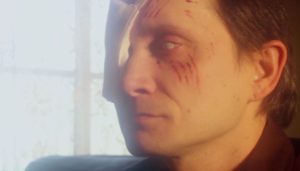
Fulci was obsessed with ocular violence. Eyes were penetrated with glass, knives, steel rods, and razor blades, among other things, and we see some of that here. There is some surprisingly over the top violence in one particular scene with a stab wound that reminded me of the gut puking scene in Gates Of Hell. Great job done on this one. The ending is very intriguing as we learn of motives and become privy to the bizarre story triangle of “The House Of The Black Cat.”
The next story, simply titled “Black,” is a whole different take on the material. It involves adultery and murder and plays out as more of a twisted thriller. Italian director Domiziano Cristopharo always delivers an artistic approach, even in his on screen displays of madness and violence. This one has a feeling of decadence with the luxury hotel and cheating wife (Chiara Pavoni).
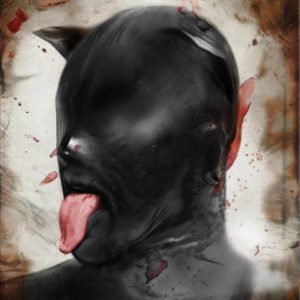
The Wife is having an affair with The Lover, played by Cleverson Rodrigues. The Lover works for the hotel and has steamy romps with his middle aged mistress. We get an abundance of nudity in this one and some violence. I notice in Cristopharo’s films, he casts a strong male lead character, and he does this once again with Rodrigues’ The Lover, who finds himself in a situation that may not be all that it appears. The Husband (Giorgio Agri) comes knocking and a confrontation ensues with rather twisting circumstances.
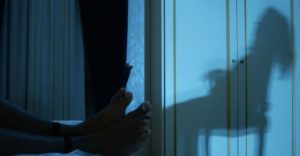
Finally we get Brace Beltempo’s “Insomnia,” which tells the story of a family whose life has been affected by their mother’s insomnia/depression. The mother, Emily (Selene Feltrin), seems to be kept awake at night by hearing sounds of a cat growling in her sleep. The father, James (Stefano Sala), and his daughter, Sophie (Martina Ambrosini), are struggling with the crisis while the nanny, Alice (Giorgia Masciari), has been filling the void as a mother figure to the family. This night seems to be different. As the sounds of the cat start ringing in Emily’s ears, she discovers an amulet etched with a picture of a black cat and it possesses her with an evil force.
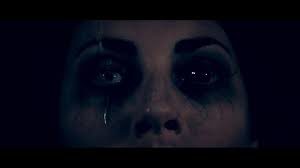
“Insomnia” uses beautiful photography and authentic settings to its advantage. While not overly graphic in violence, it does get its message across by implying more than displaying. “Insomnia” definitely sets a more moody and bleak tone compared to the other two shorts, but it delivers on its cast’s performances and storytelling. P.O.E. 4: The Black Cat is a unique entry in the P.O.E. series. A revisioning of Edgar Allan Poe’s work competently told in modern styling. Its ability to unfold some great stories continues in the films and it remains an interesting and intriguing collection.
 PopHorror Let's Get Scared
PopHorror Let's Get Scared
